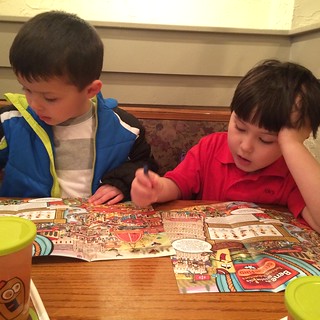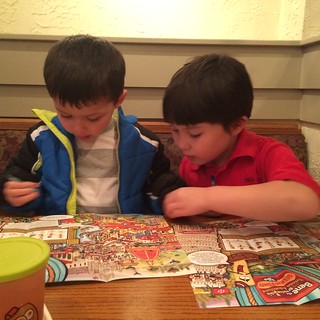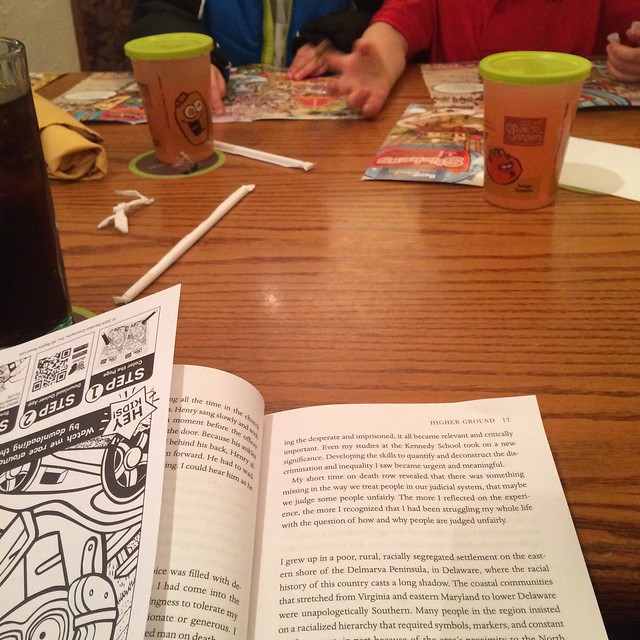Racism and a lack of imagination
/The last summer of college I spent at home, I hostessed at a chain restaurant that is known in Ohio for serving breakfast all day. Until that summer, I didn't know that there were people on earth who ate more than one meal a day at the same restaurant. As it turns out, the usuals at this restaurant often took 2-3 meals a day there. They considered the waitstaff family, their usual tables were just extensions of their homes. During one of my first shifts, the wait staff alerted me to one of the usuals. Val was pegged as "difficult." I quickly learned what qualified Val as difficult. She came in every evening with her two children. She rarely ordered a meal for herself. She ordered kids' meals and ate their leftovers. She sent food back that wasn't to her satisfaction.
I learned that these were high crimes in restaurantville. There is an unwritten code of conduct for being a usual. It requires that one runs up a decent tab and doesn't complain.
I also learned that the penalties for those who broke the code of conduct are just a little bit more severe if your waitstaff is all white and you're aren't white. And Val and her two children? Were black.
I was intimidated by Val. The first time I sat her, I learned my lesson. I started to lead her and her children, with kids' menu packets in tow, toward the back of the restaurant. "Noooope nope no! Not sitting back there. Not sitting in the back of the bus."
Got it. So I was not to sit Val in the back. But if you've ever made your living by playing Tetris with tables, you know that sometimes you can't honor every request. You don't want to slam certain waitstaffers with a fresh crop of tables all at once or there will be hell to pay. I began to perceive Val as a mosquito in the summer. She was always there, but if I protected myself, she wouldn't bite.
The waitstaff groaned about Val in the breakroom. How the manager coddled her. How she tipped poorly. How she sent food back.
Val came in most nights with her children. I don't know if she was married or divorced. Here is what I do remember about my personal encounters with her besides the mistake of seating her in the back: She was polite and quiet. She was always dressed in professional attire as though she was coming from work. She always had a paperback book with her and occasionally would sit reading it at her table while her children ate their meals.
One of the middle-aged hostesses once remarked, "Val is very well-educated."
I remember wondering why Val was the only customer that whole summer I ever heard consistent complaints about, or about the fact that she was "very well-educated."
***
Fifteen years later, I am sitting in my work clothes at a chain restaurant. I am sitting across from my two children, happily occupied by their kiddie menu crossword puzzles. I take the chance for the first time all day to open up a book for pleasure. My husband is not with us as he works most evenings. I am relieved to not have to cook and am reluctant to buy my children their own separate meals when I know I will be finishing their leftovers.
Fifteen years later and I am Val. Except I am not a usual and no one comments on my education level when I bust out my book at a restaurant. When I misplace my gift card, no one questions my intent or ability to pay. When I have to run and get my wallet in the car (long day), our waitress offers to watch my children. I am Val except I am white and therefore I can only fathom how Val felt.
Fifteen years will not absolve me, though. Why did it take me half of my life to understand a faithful patron who wanted what she paid for and who wanted to model for her children the service they should expect in a restaurant?
In other words, why did I lack imagination 15 years ago? Why did I have to wait fifteen years to experience a taste of what Val faced (and chose to face) each day?
The problem we have in dissolving the -isms that poison our lives is that we are lazy imaginaries. Because we are carnivores, we can't imagine what might be difficult for vegetarians at barbecues. Because we never struggle to find shoes in our size, surely those who do are crybabies. Inconvenience sparks us to change. Make my life difficult and I will modify my systems.
The difficulty in having a lack of difficulty is perhaps the definition of white privilege.
I pray for difficulties. I desire a better imagination. But most of all, I strive for a world where I don't have to fathom any of this, because neither does Val.



